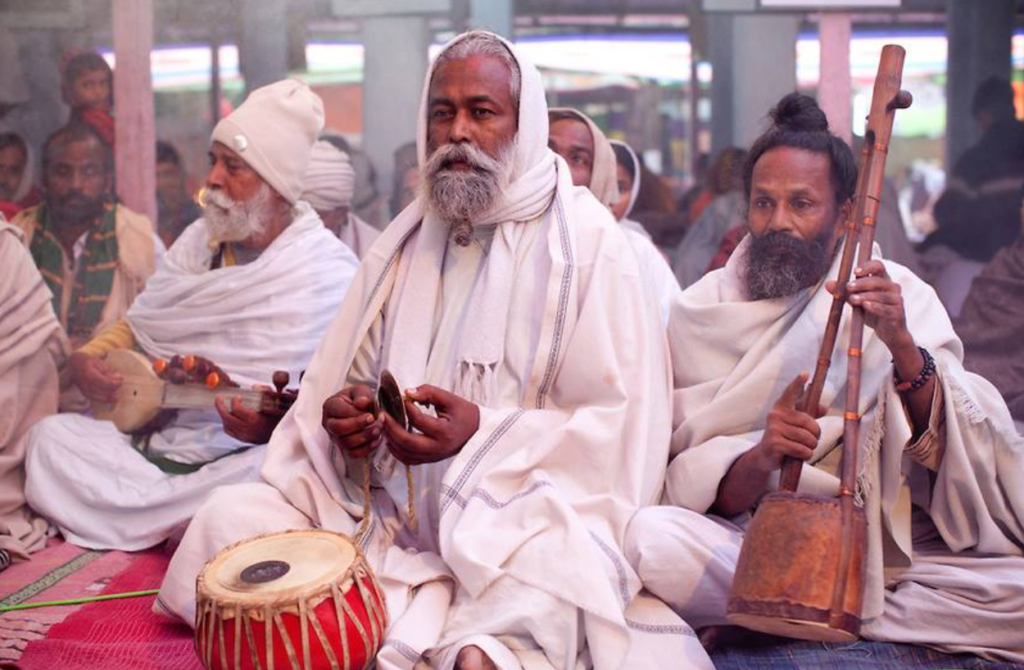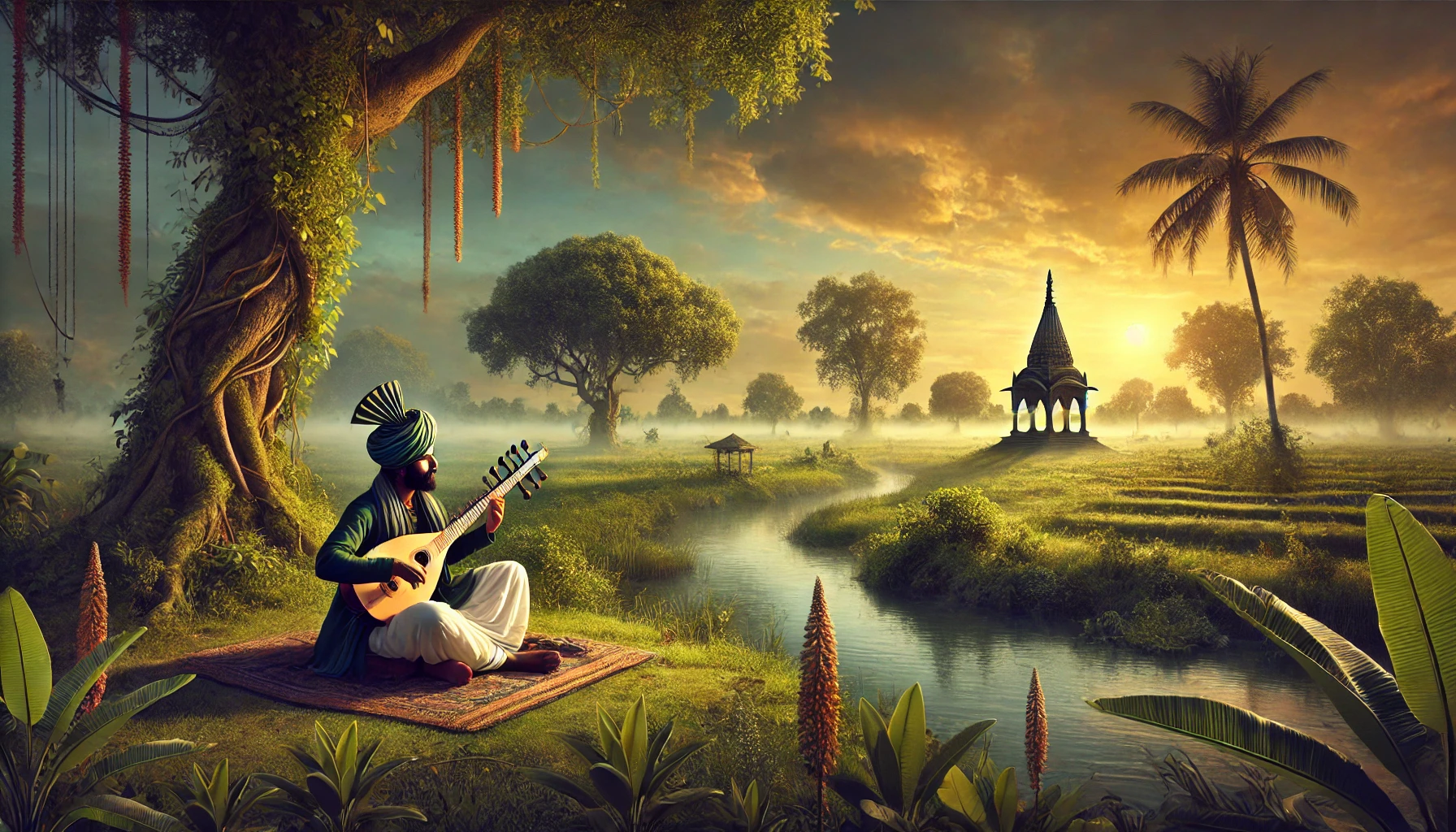The Baul tradition, rooted in Bengal’s rural heartlands, blends Hindu Bhakti, Sufi mysticism, and folk spirituality into a way of life centered on love, simplicity, and self-realization. Rejecting religious rituals and social divisions, the Bauls emphasize finding the divine within oneself.
At the heart of this movement stands Fakir Lalon Shah, whose profound songs and teachings celebrate unity, humanity, and spiritual freedom. Through music and a nomadic lifestyle, the Bauls continue to inspire introspection and challenge conventional norms, offering timeless wisdom for a more connected and meaningful existence.
Origins of Baul Life: A Syncretic Spiritual Movement
The Baul tradition is believed to have originated in the 15th century within Bengal, encompassing modern Bangladesh and West Bengal, India. Emerging as a response to rigid religious orthodoxy, it created a spiritual movement that emphasized unity, love, and self-realization. Bauls were wandering mystics who challenged institutionalized religions by merging elements of Hinduism, Islam (Sufism), and local folk traditions.
Cultural Syncretism
The Bauls borrowed from diverse spiritual ideologies:
- From Hinduism: The concept of Atman (soul) and Bhakti (devotional love).
- From Sufism: The search for divine truth through love and music (Ishq-e-Haqiqi).
- From Folk Traditions: Emphasis on nature, simplicity, and community living.
Baul songs and practices emerged as expressions of these shared beliefs, breaking barriers between religious doctrines and promoting inclusivity.
Philosophy of the Bauls: Seeking the Divine Within
At the core of Baul philosophy lies the belief that the divine resides not in temples, mosques, or scriptures but within the human soul. Their teachings focus on the inner journey—a quest for spiritual awakening through self-realization, love, and joy.
Core Tenets of Baul Philosophy
- The Soul as the Ultimate Reality: Bauls believe that the Maner Manush (the “man of the heart”) or Atman is the key to understanding divine truth. External rituals, therefore, are seen as distractions.
- Rejection of Materialism: Bauls embrace a life of detachment from material wealth and societal expectations, focusing instead on simplicity and spiritual growth.
- Equality and Inclusivity: They reject caste, religious divisions, and gender inequality, promoting universal brotherhood.
- Spiritual Realization Through Love: Love, both human and divine, is seen as the bridge to self-discovery and enlightenment.
This philosophy is reflected in their lifestyle, practices, and music, which collectively aim to inspire introspection and harmony.
The Daily Life of a Baul: Nomadic and Harmonious

The Life and Practice of Lalon Shadhok
Baul practitioners lead simple and nomadic lives, often traveling from village to village to share their songs, ideas, and way of living. Their everyday existence reflects their belief in harmony with nature and the search for spiritual fulfillment in the mundane.
Lifestyle and Practices
- Nomadic Living: Bauls wander freely, performing their soulful music in villages, markets, and festivals.
- Communal Life: They often live in small, close-knit communities (Akhra), where sharing and cooperation are central values.
- Minimalism: Bauls embrace minimalism, owning little more than their instruments, clothes, and songs.
- Music as Meditation: Their musical performances are spiritual acts designed to transcend worldly worries and inspire self-reflection.
Bauls see God not as a distant entity but as an inseparable part of everyday life—found in nature, relationships, and the human heart.
Fakir Lalon Shah: The Soul of the Baul Movement
No discussion of Baul life is complete without honoring Fakir Lalon Shah, one of the most influential figures in Baul history. Born in the early 19th century in Kushtia, Bangladesh, Lalon’s life was marked by hardship, poverty, and exclusion. Yet, he transcended these challenges to become a beacon of spiritual and social rebellion.
Life and Struggles
Lalon’s early life remains shrouded in mystery, with conflicting stories about his origins. He lost his parents at a young age and faced rejection due to societal divisions. Despite this, he emerged as a visionary who shaped the Baul movement and gave it a philosophical depth that still resonates today.
Teachings and Philosophy
Lalon’s teachings, expressed through his Lalon Geet (songs), challenge societal norms and emphasize:
- Unity of Humanity: He rejected religious dogma, caste hierarchies, and gender discrimination, proclaiming the equality of all beings.
- Inner Realization: Lalon stressed the importance of discovering the divine within oneself rather than searching outside.
- Symbolism and Simplicity: His songs used accessible rural imagery to convey profound spiritual truths.
Legacy of Fakir Lalon Shah and the Baul Tradition
Fakir Lalon Shah’s legacy lies in his unwavering commitment to spiritual freedom, equality, and self-realization. Through his powerful songs and teachings, he challenged social norms, caste distinctions, and religious dogma, advocating for a deeper connection to the divine that transcended boundaries. The Baul tradition, as embodied by Lalon, continues to inspire artists, musicians, and thinkers, both in Bengal and globally, promoting values of simplicity, love, and direct personal experience of the divine. His influence on Bengali culture and beyond is a testament to the enduring power of his message and its relevance in today’s world.
Baul Music and Poetry: A Path to the Divine
Baul music serves as the heartbeat of their philosophy, acting as both spiritual expression and communal celebration. Their songs, often accompanied by traditional instruments, carry deep philosophical messages wrapped in simplicity.

Shah Lalon Fakir Mazar, Kushtia
Key Instruments
- Ektara: A one-stringed instrument symbolizing unity and simplicity.
- Dotara: A two-stringed lute used to create rhythmic melodies.
- Duggi and Khamak: Percussion instruments adding a hypnotic quality to Baul music.
Themes in Baul Songs
- Love and Devotion: Songs celebrate love as the pathway to the divine.
- Unity and Equality: Lalon’s compositions particularly emphasize breaking societal and religious divides.
- Symbolism: Metaphors from rural life (e.g., rivers, boats, and birds) are used to explore human existence, mortality, and spirituality.
Baul music creates a meditative experience for listeners, guiding them towards introspection and spiritual awakening.
Cultural and Social Impact of Baul Tradition
The Baul tradition and Fakir Lalon’s teachings have left an indelible mark on Bengali culture, influencing literature, theater, music, and even modern art forms.
Influence on Bengali Arts
- Writers like Rabindranath Tagore were deeply inspired by Baul philosophy, incorporating its themes into their works.
- Baul music continues to shape contemporary folk and fusion genres, resonating with global audiences.
A Bridge Between Cultures
The Baul movement’s blend of Hindu, Sufi, and folk elements represents a rare cultural synthesis, fostering interfaith dialogue and harmony. Its universal themes of love, equality, and spirituality continue to attract people from diverse backgrounds.
Modern Challenges and Relevance
In today’s fast-paced, globalized world, the Baul tradition faces both challenges and opportunities:
- Commercialization: The growing commercialization of Baul music risks diluting its spiritual essence.
- Cultural Preservation: Efforts are needed to protect and revive authentic Baul traditions amidst modern influences.
Despite these challenges, the fundamental Baul ideals—simplicity, freedom, and self-realization—remain profoundly relevant. In an age of materialism and disconnection, the Baul way of life offers a timeless message of spiritual fulfillment and harmony.
Conclusion
The Baul tradition and Fakir Lalon Shah’s legacy represent a profound cultural and spiritual movement that continues to inspire individuals across time and space. Their music, philosophy, and way of life challenge societal norms while celebrating the beauty of simplicity and the divinity within the human soul. In exploring the rich heritage of Baul culture, we find timeless wisdom that guides us toward a more harmonious and spiritually fulfilling existence.
In a world that often prioritizes division and materialism, the Baul message stands as a beacon of unity, love, and inner peace—an eternal call to rediscover the divine within ourselves and the world around us.


